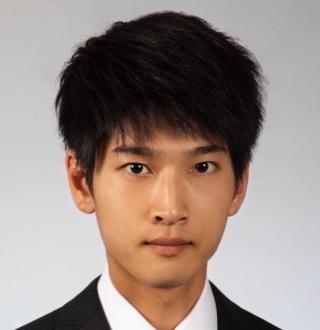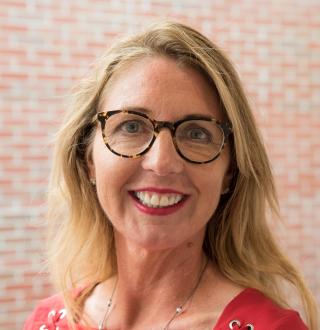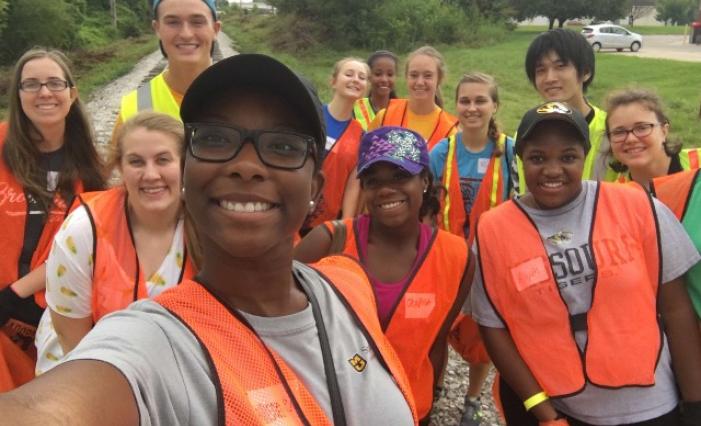Discovering a 'second home:' Student maintains strong ties to Trulaske from Japan
Masato Takeshita poses with Truman and fellow international students in the Intensive English Program at an event in 2016. From left: Sergey Iliyin (Russia), Takeshita, Fray David Peralta Ruben (Dominican Republic), and Batzorig Bat-Ireedui (Mongolia).
By Stephen Schmidt
Before coming to the University of Missouri to pursue a BS BA degree at the Trulaske College of Business in the fall of 2018, Masato Takeshita — second from the left in the photo above — had never traveled outside of his native Japan. Furthermore, he spent most of his time in the bustling metropolis of Tokyo, the country’s capital city and one of the world’s largest with close to 14 million people within its limits.
“He went a whole stratosphere out of his comfort zone,” said Annette Kendall, assistant teaching professor at Trulaske and director of the Center for Entrepreneurship and Innovation.
A whole new world
From the onset of researching options for his undergraduate studies, the now-25-year-old Takeshita wanted to truly immerse himself in another culture. Furthermore, when looking at colleges in the United States, he stayed clear of big cities on the east and west coasts — such as New York City or Los Angeles — to minimize the chance of meeting fellow Japanese natives. After doing research on Mizzou, Columbia’s smaller size appealed to him.
“I felt like Mizzou was good, because I heard that Columbia is a safe place to live,” Takeshita said.
What he had not heard was how kind people at the university and in the city could be to someone who had never really tried to speak English before heading to the States.
After arriving in Columbia in 2016, Takeshita enrolled in the Intensive English Program offered through International Programs at Mizzou for three semesters before starting his undergraduate studies in 2018. Although he had learned how to read and write English in junior high and high school in Japan, he had not reached a fluency level high enough to immediately live and study in the U.S.
“The friends I met there had the same level of English ability as me, so we got along easily and are still good friends now,” Takeshita said.
Before long, the necessity to speak English to communicate to those around him helped raise his proficiency. He would practice his English among friends — many of whom were fellow international students at Mizzou who were classmates in the English class — while studying and attending events at the MU Student Center.
They would also frequent one of his favorite establishments, Shakespeare’s Pizza. “That's my favorite pizza,” Takeshita said. “It’s better than all of the pizza stores I've been in Japan.”
Then COVID-19 hit, forcing Takeshita to go back to Tokyo in the early spring of 2020 in a rather abrupt manner.
“Suddenly there was a pandemic, so I couldn't say goodbye to many of my friends,” said Takeshita, who keeps up with friends and classmates on the other side of the world these days mostly through Zoom, Facebook Messenger and WhatsApp.
With his second long plane ride in the books, Takeshita had to continue his degree remotely with a 14-hour time difference between Tokyo and Columbia. In many instances, his Zoom classes would take place in the middle of the night — a day ahead — in Japanese Standard Time, compelling Takeshita to go to sleep around 8 p.m., wake up an hour or so before a class in the time frame of 1 to 3 a.m.., and then go back to sleep after the class ended.
‘He just blossomed’
Under that backdrop, Takeshita took six classes in the fall 2020 semester, one of which was an entrepreneurial mindset class taught by Kendall.
Late in the semester, the class was visited by Vicki Priday, a businesswoman who, like Kendall, hails from New Zealand. Priday was talking to the class about self-confidence — and how critical it is to being successful in the entrepreneurial space. Her testimony inspired several students to admit their lack of self-confidence, one of whom was Takeshita. After he spoke, Kendall addressed the class with disbelief about his statement.
"He said something about not being brave. I said ‘You're the bravest person on this Zoom call right now of all of us, because you not only came to another country, but you left all of your family and friends to come and study in another country,’” Kendall said. “You came to another country where they don't even speak your language. That is so brave.’”
From that moment on, Takeshita wore a smile and excelled, going on to be one of the highest grades in the class.
"It’s not like he wasn’t a good student before, but from then on he just blossomed,” Kendall said.
Many journeys, one classroom
Having come to Columbia as a doctoral student in 2015 by way of New Zealand, Kendall can empathize with the journeys of Takeshita and other international students at Trulaske. Kendall’s hometown of Dannevirke with its approximately 5,000 residents, though, stands in stark contrast to the massive size of Tokyo, the site of the recent Summer Olympic Games.
At last check, there were a total of 29 international students at Trulaske at the undergraduate and graduate levels, according to Mizzou’s International Center. Takeshita is the only Trulaske student from Japan, but one of 18 students from Asia, including 10 students from China.
Every semester, the students in Kendall’s class take part in an Entrepreneurial Mindset Profile assessment to identify individual skills, personality traits and challenges. When Takeshita first took the assessment, he was a bit disheartened by some low scores. Kendall said this can be typical for non-native English-speaking students in her class who take the assessment, as the language barrier can often misconstrue the abilities of both the students and their classmates.
When Takeshita took the same assessment three months later, he showed remarkable improvement in his scores related to entrepreneurial traits, such as risk acceptance, action orientation and the need to succeed — and had gained a greater appreciation for all of the major challenges he was able to overcome.
“Students initially perceive themselves in a certain way. Students who have low self-confidence will say, ‘I'm not good at this. I'm not good at that,’ but throughout the course they do certain things that bring them to the attention of themselves,” Kendall said. “They're put in situations that enable them to go, 'Oh, I actually am good at that.’ And so it's not that the course helps them develop those skills, but it puts them in the students’ line of sight.”
Looking ahead
Takeshita, who took six more classes in the spring 2021 semester, plans to finish his degree from Trulaske later this month. Upon completing it, he wants to remain in Japan and work for an IT-related consulting firm.
Still, the student who taught himself the HTML and CSS programming languages during a summer break at Mizzou also one day envisions forming an IT-based startup company of his own.
In spite of wanting to remain in Japan for the start of his professional career, he welcomes the opportunity to come back to Missouri to see his friends, professors and other members of the Columbia community — even if it is not possible for him to finish his studies at Trulaske in person. He still has some belongings that he left at a friend’s house that he needs to retrieve.
“Columbia is my second home,” said Takeshita, who encourages other international students to take a bold leap like he did, given the collective support he has received along the way.
“International students should not be afraid,” he said. “The people at Mizzou are so kind. They help you each day.”


